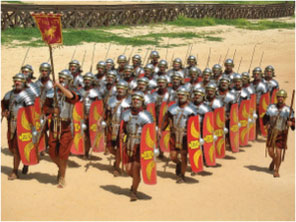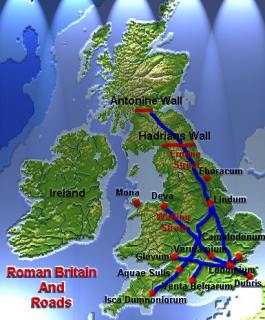Реферат: People of Ancient Britain History of Britain
Несмотря на свидетельства в виде крепостей на холмах и каменных башен, жизнь в доисторической Англии не всегда была полна насилия. Прибытие новых иммигрантов должно быть создавало проблемы, но они обычно прибывали небольшими группами и вскоре смешивались с местным населением. Никогда не было случая, чтобы местные племена были разгромлены более агрессивными и более продвинутыми захватчиками. Кельты, которые являлись смешанной расой, женились на аборигенах, чьи предки также были иммигрантами из северной Европы и из Испании.
Англия была неизвестна более цивилизованным частям Европы, пока её не посетил – 'открыл' фактически - Пифей, образованный торговец из Марселя приблизительно в 320 до н.э. Пифей создал первое описание людей, которых он назвал кельтами. Он говорил, что они были благородным и гостеприимным народом.
Мнение Пифея удивляет. Следующий образованный человек, посетивший Британию, описал британцев как жестокую расу, дикарей. Но этот человек явился не с дружественными намерениями. Его звали Юлий Цезарь.
Britain conquered by the Romans History of Britain (историяБритании)
In 55 ВС Britain was invaded by Julius Caesar, а Roman general and governor of Gaul (France), soon to be, in all but name, the first Roman emperor.
At that time the city of Rome was about 700 years old, but the Roman empire was much younger. As late as 211 ВС Rome had narrowly escaped destruction by the Carthaginian general, Hannibal. But Hannibal's defeat left Rome without а serious rival, and by Caesar's time it controlled an empire that stretched from Spain to the Near East.
 Two places more different than imperial Rome and Celtic Britain could hardly have existed. Roman society was urban, with grand public buildings built of marble. Britain was а country of mud huts, with no settlement large enough to be called а town. An upper-class Roman lived in greater comfort than any Britisher before the 15th century. His house even had central heating.
Two places more different than imperial Rome and Celtic Britain could hardly have existed. Roman society was urban, with grand public buildings built of marble. Britain was а country of mud huts, with no settlement large enough to be called а town. An upper-class Roman lived in greater comfort than any Britisher before the 15th century. His house even had central heating.
The Romans, as heirs of the civilization of Ancient Greece, were interested in art, philosophy and history (Caesar himself wrote good military history in simple prose). The British could neither read nor write. They were not savages, and in some ways Celtic art was superior to Roman, or so it seems to us, but the Romans naturally thought of them as hopelessly primitive barbarians. То the Romans - and to many non-Romans too - there was but one worthwhile form of society, and that was their own. The only useful function of other peoples was to contribute to the glory of Rome.
Britain was а mysterious isle to the Romans. But Caesar knew it contained valuable minerals, and he knew also that the British were helping their cousins in Gaul against Rome. Не decided on invasion.
Caesar had another motive - personal glory; yet his invasion nearly ended in disaster. Landing on an open beach near Deal, the Romans fought their way ashore, beat the assembled British, and accepted tributes from some of the chiefs. But а storm wrecked their ships and they had to scramblе back to Gaul, having advanced little farther than the Kent coast.
Next year Caesar came again, this time with а much larger expedition - five legions (about 25,000 men) and 800 ships. The British tribes sank their differences, uniting under the leadership of Cassivellaunus, and it took some time for Caesar to work out а way of dealing with the British chariots. The Romans were not used to this form of warfare, as chariots were obsolete in Gaul.
But Cassivellaunus failed to stop the attack. Caesar advanced through Kent, crossed the Thames at London, and marched through the thick forests of Essex towards Colchester. When an attack on the Romans' naval camp failed, the British decided to come to terms. Caesar took hostages and imposed an annual tax (we do not know for how long the British paid it). Then he sailed back to Gaul.
The British had been defeated but not conquered, and for nearly а hundred years afterwards no Roman army appeared in Britain. Caesar's expeditions had shown that Britain would not be conquered easily.
 Between 54 BC and AD 43, the date of the Roman conquest, Lowland Britain prospered. The country enjoyed the benefits of trade with the great Roman empire without the disadvantages of Roman rule. The British came to know the Romans well. Roman merchants travelled to Britain, and Roman influence was strong. Many British leaders were pro-Roman. In some respects, Britain was 'Romanized' before the Roman conquest.
Between 54 BC and AD 43, the date of the Roman conquest, Lowland Britain prospered. The country enjoyed the benefits of trade with the great Roman empire without the disadvantages of Roman rule. The British came to know the Romans well. Roman merchants travelled to Britain, and Roman influence was strong. Many British leaders were pro-Roman. In some respects, Britain was 'Romanized' before the Roman conquest.
In AD 43 the Romans landed at Richborough, Kent, and advanced steadily north and west. They were chiefly interested in the fertile south-east, but they soon found that the minerals they wanted (lead, copper, etc.) lауin the mountainous parts. They found, too, that having conquered part of Britain it was hard to draw а line and say: that is where we stop.
The British were still not united, and the main opponent of the Romans, а clever and determined king of the Catuvellauni named Caratacus, was unable to create а national coalition. Не did his best, and when defeated in central England he retired to south-east Wales, where the Silures resisted the Romans more fiercely than any other people. Then, as Roman strength built up in the West Country, Caratacus fell back to Snowdonia, where the Ordovices kept up the struggle. After а hard battle, the Rоmans captured their stronghold near Caersws, and all of Caratacus's family were taken prisoner. Не fled to Brigantia (northern England), but the queen of the Brigantes favoured Rome and had him arrested. Не was sent in chains to Rome. There, he was triumphantly displayed before the people as а symbol of the Roman victory. Caratacus looked in wonder at the rich and powerful city. 'Why', he asked his captors, 'with all these great buildings, do you still want our poor huts?'
The Romans brought their campaign in Wales to а conclusion by conquering the Isle of Anglesey, off North Wales. Anglesey was а centre of the cult of the Druids, а class of priests (or witchdoctors) who had great influence among the British and knew that Rome's victory would mean their deaths. The Romans, who were tolerant of most local customs, were determined to destroy the Druids, as they disliked their ritual of human sacrifice.
As the Romans looked across the Menai Straits, they saw а hoard of hostile warriors, urged on to battle by mad-looking women in black and by the robed figures of the Druids, lifting their bloody hands to heaven to сall down curses on their enemies. Grimly, the Romans paddled their boats across the straits, the cavalry swimming their horses alongside. They cut their way through the rabble opposing them and slaughtered the Druids among their own altars.
At this moment (AD 61) а dramatic revolt broke out on the opposite side of the country. The king of the Iceni had died, and the Romans refused to recognize his daughters as his successors. The Roman soldiers in East Anglia were not well led (their governor was in Wales, of course), and they behaved stupidly towards the local people.They swaggered brutally through the country, stealing what they fancied. They raped the king's daughters and gave their mother, Queen Boudicca, а whipping.
Suddenly the country was in flames. Boudicca's people were joined by others, including many who had first welcomed the Romans but had since suffered from their greed and pride. А wild army swept down upon Colchester. London and St Albans fеll to the rebels, who killed аll the Roman colonists. Meanwhile, the governor hastily gathered his troops and, with 10,000 men, he met Boudicca in battle north-west of Towcester. The rebels were defeated. Boudicca died soon afterwards, and the revolt fizzled out.
Probably, the Romans could have conquered all of Britain if they had been determined to do so. But Britain was on the fringe of their empire; it was small, and expensive to govern. Some Romans thought it was not worth the cost.
Julius Agricola - the best of the governors of Britain, came near to completing the conquest before he was recalled to Rome. Не advanced north across the Forth and the Тау, and in AD 84 he defeated the Caledonians of northern Scotland at the great battle of Mons Graupius. Roman historians say that 10,000 Caledonians were killed, and only 360 Romans.
But soon afterwards the Romans decided to retreat. After some serious setbacks in the north, the Emperor Hadrian marked the frontier with а great wall across Britain. Built in the 120s, the wall was the largest structure in the Roman empire.
Although Hadrian's Wall was such а vast engineering project, the Romans were never certain that it was in quite the right place. In 142 а second wall was built farther north. Serious outbreaks continued; the Picts attacked from Scotland and the Brigantes from Yorkshire. In а revolt at the end of the 2nd century all the forts from York northward were destroyed.
Eventually, the Romans withdrew to Hadrian's Wall, which marked the real frontier of their power, although Roman patrols ranged far beyond it and Roman peace prevailed in the Scottish Lowlands.
In the third century, Roman Britain was already being attacked by Saxon pirates from Germany, and forts had to be built along the 'Saxon Shore'. In 367 the Saxons, the Picts and the Scots (aggressive Irish immigrants who were beginning to settle in south-west Scotland) attacked together. Although order was eventually restored, Roman power was waning fast and in 406 all troops were recalled from Britain to defend Rome from the attacks of the Goths. The legions never returned.
The Roman Province of Britain History of Britain (историяБритании)
The Romans were in Britain for over 350 years - а very long time in the history of any country. In the north and west they remained an occupying army, keeping а grip on an often hostile people; but Lowland Britain (most of England) was thoroughly Romanized. The effects of the occupation were surprisingly small in the long run, but Roman rule certainly changed the lives of the British.
The greatest blessing of Roman rule was the рах Romana, 'Roman peace'. Tribal wars in Lowland Britain stopped, and the attacks of outsiders, like the Picts from the north and the Saxons from overseas, were resisted. The Romans set up law courts and enforced justice, though their idea of justice was not the same as ours and their punishments, which included execution by crucifixion, were cruel.